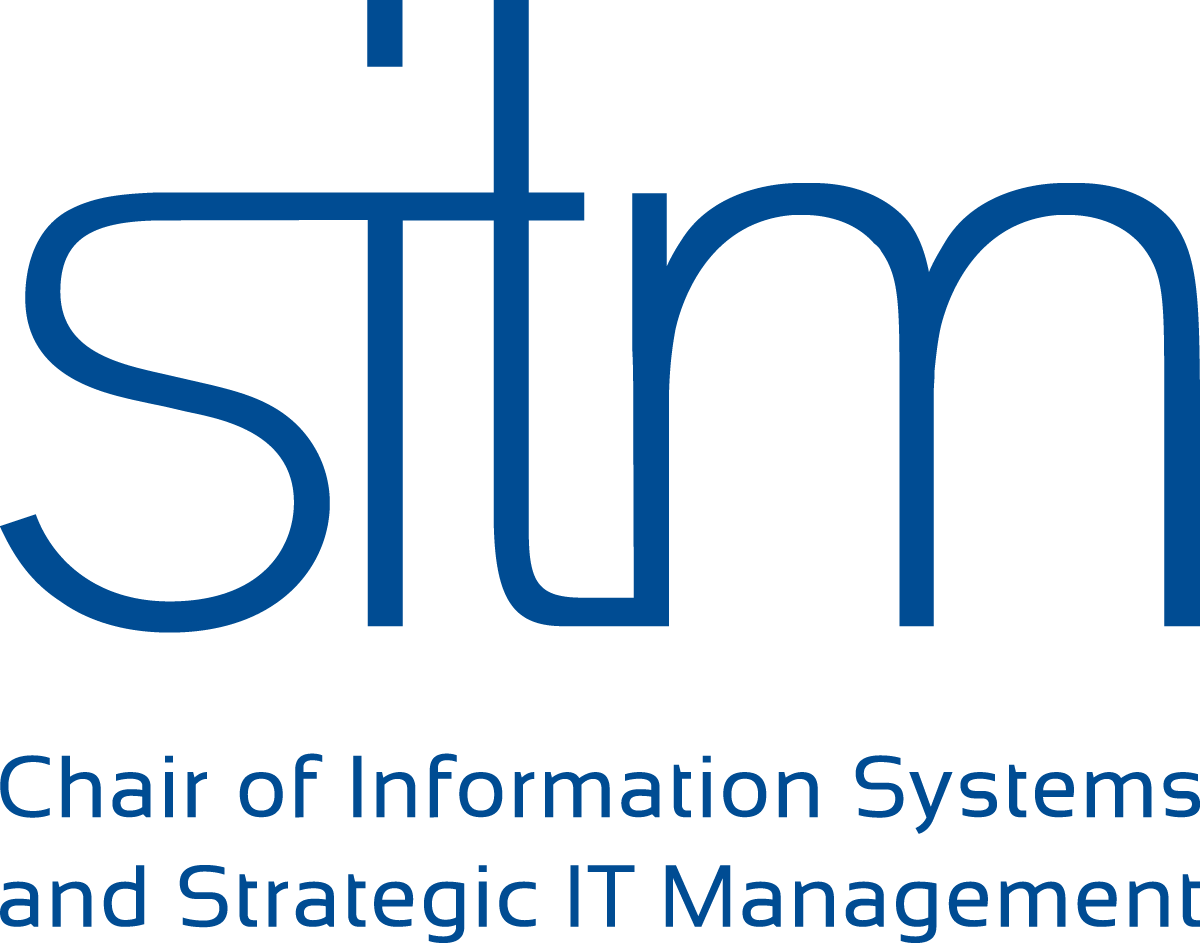Former Staff
Curriculum Vitae:
Academics
- Since 05/2017: Ph.D. Student at the Chair of Information Systems and Strategic IT Management, University of Duisburg-Essen, Essen, Germany
- 10/2014 - 04/2017: Study of Information Systems (degree: Master of Science), University of Duisburg-Essen, Essen Germany
- 01/2016 - 05/2016: Semester abroad at the University of Jyväskylä, Jyväskylä, Finland
- 09/2008 – 03/2014: Study of Economics (degree: Bachelor of Science), Technical University of Dortmund, Dortmund, Germany
Work Experience
- Since 05/2017: Research Assistant at the Chair of Information Systems and Strategic IT Management, University of Duisburg-Essen, Essen, Germany
- 06/2016 – 04/2017: Research Aide at the Chair of Information Systems and Strategic IT Management, University of Duisburg-Essen, Essen, Germany
- 02/2015 – 05/2016: Student Assistant at the Chair of Information Systems and Strategic IT Management, University of Duisburg-Essen, Essen, Germany
- 03/2013 – 04/2014: Student Assistant at the Institute for School Development Research, Dortmund, Germany
- 09/2012 – 02/2013: Internship at ABSOLVENTA GmbH, Berlin, Germany
- 10/2010 – 08/2012: Student Assistant at the Institute for School Development Research, Dortmund, Germany
Fields of Research:
- Green IT and Green IS
Publications:
- Alsdorf, H: It’s Just Not Sexy: How Managerial Assumptions Adversely Affect Corporate Sustainability Engagement and Sustainable Technology Adoption. In: Sustainability, Vol14 (2022), No 22. DetailsCitation
- Schaffeld, L.; Alsdorf, H.; Ahlemann, F.: Nudging Pro-Environmental Behavior - The influence of decision-making styles on the effectiveness of digital nudges. In: Sustainability (Accepted, not published) (2022). DetailsCitation
- Alsdorf, H.; Kosmol, L.; Fernandez, Z. R.: Relevanz und Bedeutung der Nachhaltigkeit - Green IT/IS als Nischenthema in KMU der DACH-Region. In: HMD - Praxis der Wirtschaftsinformatik (2022), No 1. DetailsCitation
- Puvaneswaran, S; Alsdorf, H.: Why People and Processes Enable Sustainability and Not the Latest Technology: On Achieving Green IT/IS Capability Maturity. In: Pacific Asia Conference on Information Systems (PACIS). Dubai, UAE, 2021. DetailsCitation
- Gonserkewitz, P.; Schmermbeck, H.; Ahlemann, F.: Green IT Quick Wins – Wie Unternehmen durch kurzfristig umsetzbare IT-Maßnahmen langfristig mehr Nachhaltigkeit erreichen können. In: HMD - Praxis der Wirtschaftsinformatik, Vol58 (2021), No 1, p. 167-180. DetailsCitation
- Schmermbeck, H.; Thünnesen, J.; Voss, N.; Ahlemann, F.: Green IS Does Not Just Save Energy - Insights from a Survey on Organizations' Uses of Sustainable Technologies. In: Proceedings of the 53rd annual Hawaii International Conference on Systems Science. Hawaii, USA, 2020. AbstractDetailsFull textCitation
Organizations are increasingly challenged to digitally transform themselves, and to respond to calls for increased sustainability. While the adoption of sustainable innovations, such as Green information systems (Green IS), are one way to address both challenges, there are only few insights that provide non-technology or company-specific insights into specific positive and negative Green IS outcomes. We address this shortcoming and shed light on Green IS adoption outcomes, as well as their interconnection to general sustainability initiatives in organizations. In a descriptive survey we find that many organizations already employ sustainability principles, but few incorporate Green IS. We confirm organizations almost exclusively report positive outcomes of Green IS usage, such as reduced resource consumption, increased compliance with regulations, and social acceptance. Based on these findings we suggest to especially further research the process of Green IS adoption.
- Schmermbeck, H.: On making a difference: Towards an integrative framework for Green IT and Green IS adoption. In: Proceedings of the 52nd annual Hawaii International Conference on Systems Science. Hawaii, USA, 2019. AbstractDetailsCitation
Organizations and society nowadays face significant challenges. Organizations are required to fundamentally digital transform by assimilating Information Technology (IT) and Information System (IS) assets. Society faces an increasingly severe global climate disruption and needs to become more environmentally friendly. Green IT (GIT) and Green IS (GIS), as technologies and initiatives that seek to reduce the negative impacts of IT/IS on the environment, are a response to this. They can help organizations to gain a competitive advantage while also addressing broad-scale environmental issues. We undertake a literature review to frame the general GIT/GIS adoption process. We provide an overarching understanding by modeling a sequence of five cognitive adoption phases (outset, pre-adoption, adoption, post-adoption, and outcome) on four levels (environmental, societal, organizational, and individual). By recognizing that GIT/GIS adoption has multiple drivers and outcomes, we provide an extensive perspective on GIT/GIS adoption.
Tutored Theses:
- Nudging Pro-Environmental Behavior: An Experimental Study on Personality Traits and Digital Nudge Design* (Master Thesis Business Information Systems, 2022)
- Green IT/IS: An Investigation on the Interdependence of Adoption Factors (Bachelor Thesis Business Information Systems)
- Implementation of Bimodal IT in Public Organizations - An Investigation of Advantages and Disadvantages (Bachelor Thesis Business Information Systems)
- Usage of Robot Process Automation for Green Business Process Management – An Investigation of Pro and Cons (Bachelor Thesis Business Information Systems)
- Sustainable Project Management - On Transferring Sustainability Criteria to IS Projects (Bachelor Thesis Business Information Systems)
- An Overview of Green IT and Green IS Adoption Outcomes and their Interconnections (Bachelor Thesis Business Administration)
- Smart City Development - On Identifying Adoption Barriers of Smart Mobility Solutions (Bachelor Thesis Business Information Systems)
- Building Green IT and Green IS Capabilities: A Qualitative Analysis based on the IT-Capability (Master Thesis Business Information Systems)
- Organizational Adoption of Green IT/IS-Determinants of the Initiation Phase (Bachelor Thesis Business Information Systems)
- Use of Green IT in Organizations: A Categorization of Current Approaches Driven by the Natural-Resource-Based View (Bachelor Thesis Business Information Systems)
- Does Critical Chain Project Management Solve Scheduling Issues of Traditional Project Management? - A comparison of methods (Bachelor Thesis Business Administration)


